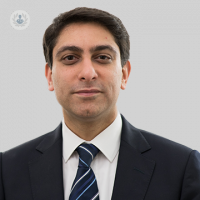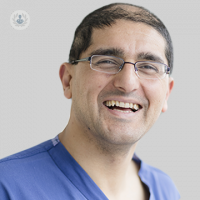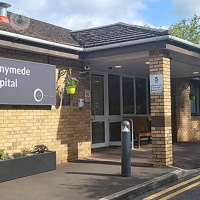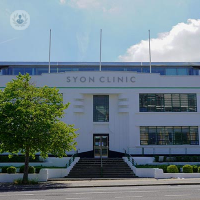What is asthma?
Asthma is a condition which occurs when the upper airways constrict as a result of a particular trigger, for example, an extreme reaction to some sort of allergen/stimulus such as viral infections, pollen, or overwhelming stress or exercise.
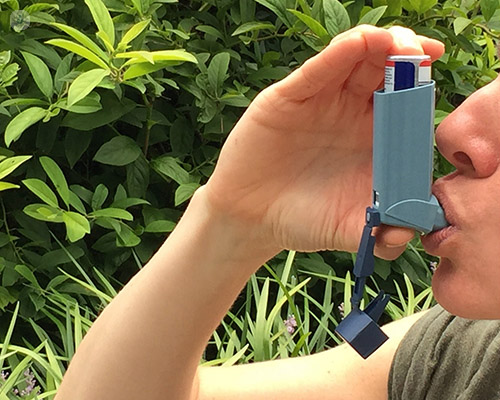
Asthma can present at any age though it is usually not diagnosed in early childhood (especially infants) unless there is a strong family history, and typical recurrent symptoms. Many young children with asthma present symptoms similar to a condition called ‘viral induced wheeze’ which does not necessarily lead to asthma.
There is usually a family history of some sort of atopic disorder such as hay fever, eczema or other allergy.
What are the symptoms?
The child typically presents with a wheeze (a musical sound when breathing out). This sound is produced because the airway is constricted while air is breathed out. This may be associated with other symptoms such as difficulty in breathing, feeling tired and fatigued.
In severe cases this may produce exhaustion when the child starts getting extremely fatigued, meaning they may need further support such as oxygen and medication to dilate the airways.
How is it diagnosed?
Asthma is mostly a diagnosis made on basis of history and clinical findings. In clinical settings, children often have their breathing tested through examinations such as peak flow measurement, and sometimes lung function tests.
A chest X-ray can sometimes be requested in severe cases, however it is not a recommended test for diagnosis.
How is asthma treated?
There are usually two types of medication used:
- Reliever: an inhaler used to dilate the airways
- Preventer: an inhaler used to suppress the hyper-reactive process and inflammation.
There are also other medications known as immuno-modulators which can be used to target the process and stabilise the reactive cells causing the symptoms of asthma.
Children with severe presentation of asthma often need other supportive treatment measures such as oxygen, or in a minority of cases, a respiratory support.
Can asthma be prevented?
While the onset of the process of asthma is mostly intrinsic, an onset can be prevented by avoiding/reducing the contact with the allergens if known and possible, and taking the medications regularly as advised by the doctor.
Steroid inhaler, if prescribed, helps in preventing the further triggers if taken regularly long term, and on the doctor’s/asthma nurse’s advice.
Immuno-modulators, which suppress the process of hyper-reactivity in the airways, can help in children whose symptoms present at night, or in children who experience exercise-induced symptoms.
Can it be cured?
Many children grow out of this condition before adulthood. However, this depends on the individual and asthma can be a long-term condition.
What is the prognosis?
Asthma is usually a well-manageable condition and is not life threatening if treated in a timely manner. It is very important to recognise the symptoms, and get a doctor’s help.
Which specialist treats asthma?
In addition to paediatricians and respiratory specialists, there are many specialist asthma nurses who work in clinics and hospitals around the country, providing information and education to parents and children.
11-13-2012 10-03-2023Asthma
Professor Neal Navani - Pulmonology & respiratory medicine
Created on: 11-13-2012
Updated on: 10-03-2023
Edited by: Karolyn Judge
What is asthma?
Asthma is a condition which occurs when the upper airways constrict as a result of a particular trigger, for example, an extreme reaction to some sort of allergen/stimulus such as viral infections, pollen, or overwhelming stress or exercise.

Asthma can present at any age though it is usually not diagnosed in early childhood (especially infants) unless there is a strong family history, and typical recurrent symptoms. Many young children with asthma present symptoms similar to a condition called ‘viral induced wheeze’ which does not necessarily lead to asthma.
There is usually a family history of some sort of atopic disorder such as hay fever, eczema or other allergy.
What are the symptoms?
The child typically presents with a wheeze (a musical sound when breathing out). This sound is produced because the airway is constricted while air is breathed out. This may be associated with other symptoms such as difficulty in breathing, feeling tired and fatigued.
In severe cases this may produce exhaustion when the child starts getting extremely fatigued, meaning they may need further support such as oxygen and medication to dilate the airways.
How is it diagnosed?
Asthma is mostly a diagnosis made on basis of history and clinical findings. In clinical settings, children often have their breathing tested through examinations such as peak flow measurement, and sometimes lung function tests.
A chest X-ray can sometimes be requested in severe cases, however it is not a recommended test for diagnosis.
How is asthma treated?
There are usually two types of medication used:
- Reliever: an inhaler used to dilate the airways
- Preventer: an inhaler used to suppress the hyper-reactive process and inflammation.
There are also other medications known as immuno-modulators which can be used to target the process and stabilise the reactive cells causing the symptoms of asthma.
Children with severe presentation of asthma often need other supportive treatment measures such as oxygen, or in a minority of cases, a respiratory support.
Can asthma be prevented?
While the onset of the process of asthma is mostly intrinsic, an onset can be prevented by avoiding/reducing the contact with the allergens if known and possible, and taking the medications regularly as advised by the doctor.
Steroid inhaler, if prescribed, helps in preventing the further triggers if taken regularly long term, and on the doctor’s/asthma nurse’s advice.
Immuno-modulators, which suppress the process of hyper-reactivity in the airways, can help in children whose symptoms present at night, or in children who experience exercise-induced symptoms.
Can it be cured?
Many children grow out of this condition before adulthood. However, this depends on the individual and asthma can be a long-term condition.
What is the prognosis?
Asthma is usually a well-manageable condition and is not life threatening if treated in a timely manner. It is very important to recognise the symptoms, and get a doctor’s help.
Which specialist treats asthma?
In addition to paediatricians and respiratory specialists, there are many specialist asthma nurses who work in clinics and hospitals around the country, providing information and education to parents and children.


Challenges in treating asthma
By Dr Syed Arshad Husain
2024-12-30
Everyone who has asthma experiences symptoms slightly differently, and what works for one person might not work for someone else. In this article, expert respiratory physician Dr Syed Husain explains the treatments offered for different types of asthma, the side effects involved, and the psychological challenges of the condition. See more


Breathing difficulties while sleeping: how can I help my child?
By Mr Christopher Pepper
2024-12-30
If children experience breathing difficulties while they sleep, they can suffer from a wide range of symptoms, as explained by consultant paediatric ENT surgeon Mr Christopher Pepper in his latest article below. See more


Asthma in children: Symptoms and diagnosis
By Professor Helen Brough
2024-12-30
A persistent dry cough as well as breathing difficulties and wheezing can be a signs of allergic asthma in children. In this informative article, hgihly esteemed consultant paediatric allergist Dr Helen Brough expertly explains how asthma is diagnosed in very young children and how the condition differs in adults. See more
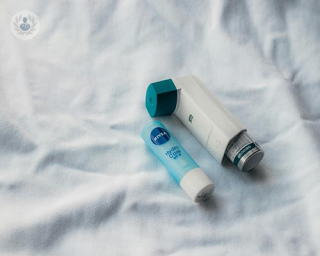

Asthma: everything you need to know
By Dr Ana de Ramon
2024-12-30
Asthma is a chronic respiratory condition that affects millions of people worldwide. This condition can significantly impact an individual's daily life and, if left unmanaged, may lead to severe complications. Renowned respiratory consultant Dr Ana de Ramon answers every question you need to know about the condition. See more
Experts in Asthma
-
Dr Robert Boyle
Paediatric allergy & immunologyExpert in:
- Asthma
- Allergic reactions
- Anaphylaxis
- Food intolerance test
- Food allergies
-
Professor Neal Navani
Pulmonology & respiratory medicineExpert in:
- Endobronchial ultrasound
- Lung cancer
- Chronic cough
- Bronchoscopy
- Asthma
- Respiratory diseases
-
Dr Sundeep Kaul
Pulmonology & respiratory medicineExpert in:
- Asthma
- Bronchoscopy
- Chronic cough
- Lung cancer
- Shortness of breath
- Long Covid
-
Dr Amit Patel
Pulmonology & respiratory medicineExpert in:
- Cough
- Asthma
- Sarcoidosis
- Pulmonary fibrosis
- Obstructive sleep apnea
-
- See all

The Runnymede Hospital - part of Circle Health Group
The Runnymede Hospital - part of Circle Health Group
Guildford Street, Ottershaw, Lyne, Chertsey KT16 0RQ
No existe teléfono en el centro.
By using the telephone number provided by TOP DOCTORS, you automatically agree to let us use your phone number for statistical and commercial purposes. For further information, read our Privacy Policy
Top Doctors

Alliance Medical Epsom
Alliance Medical Epsom
4b Dorking Rd, Epsom, KT18 7LX
No existe teléfono en el centro.
By using the telephone number provided by TOP DOCTORS, you automatically agree to let us use your phone number for statistical and commercial purposes. For further information, read our Privacy Policy
Top Doctors

Syon Clinic - part of Circle Health Group
Syon Clinic - part of Circle Health Group
941 Great West Rd, Brentford TW8 9DU
No existe teléfono en el centro.
By using the telephone number provided by TOP DOCTORS, you automatically agree to let us use your phone number for statistical and commercial purposes. For further information, read our Privacy Policy
Top Doctors
-
The Runnymede Hospital - part of Circle Health Group
Guildford Street, Ottershaw, Lyne, Chertsey KT16 0RQ, ChertseyExpert in:
- Cardiology
- Hand surgery
- General Surgery
- Maxillofacial Surgery
- Oral surgery
- Orthopaedic surgery
-
Alliance Medical Epsom
4b Dorking Rd, Epsom, KT18 7LX, EpsomExpert in:
- Cancer
- Diagnostic Imaging
- Musculoskeletal ultrasound
- Coronary CT
- Urology
-
Syon Clinic - part of Circle Health Group
941 Great West Rd, Brentford TW8 9DU, West LondonExpert in:
- Allergies nose and ears
- Allergy Dermatitis
- Allergy
- Clinical analysis
- Anxiety
- Digestive
- See all
- Most viewed diseases, medical tests, and treatments
- Snoring
- Immunotherapy
- Chronic headache
- Child nutrition
- Migraine
- Paediatric rheumatology
- Autoimmune diseases
- Joint pain
- Nutrition
- Lumbar herniated disc
